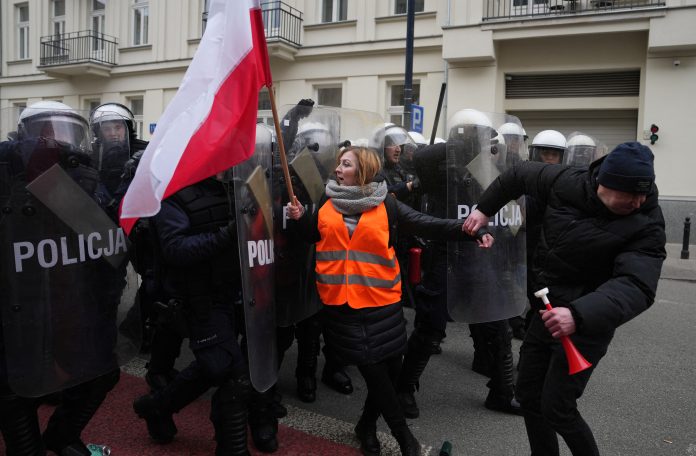Several thousand farmers clashed with police in front of the parliament building in Warsaw on 6 March in mass protests against the European Union’s Green Deal, IntelliNews reports.
Polish farmers took to the streets again after Prime Minister Donald Tusk promised them last week that he would force the EU to revise or scrap some of the Green Deal provisions affecting agriculture.
The protesters have influence over the Tusk-led government, which is campaigning ahead of local elections on 7 April, hoping it can weaken support for the opposition Law and Justice (PiS) party in its traditional rural strongholds. The government has long said it is sympathetic to farmers’ demands, fearing their anger could cost them votes in April’s elections.
The farmers want the EU to stop imports of Ukrainian agricultural products, which they say drive down prices on the Polish market.
The rally started peacefully but soon turned into scuffles with police when the demonstrators reached the parliament building.
Police said some protesters threw cobblestones at police officers. Interior Minister Marcin Kierwinski said on X that 23 people had been detained.
Michal Kolodziejczak, the deputy agriculture minister, said on Wednesday it was necessary to isolate “provocateurs and troublemakers.”
The rally took place while parliament was in session. When the sound of tear gas shots reached the plenary, an ongoing debate on the rule of law turned into a fierce dispute between the ruling majority and the opposition over the riots.
The government said provocateurs had encouraged the crowd to start scuffles because farmers had no reason for violence following Prime Minister Tusk’s promises last week. The opposition lashed out at police for knocking down protesters, including one man carrying a Polish flag, and allegedly throwing stones and cobblestones at protesters. Marcin Kierwinski said on X:
The opposition, which campaigned under the slogan of ‘standing firm for the Polish uniform’, is now in love with those who throw paving stones at the policemen.
Meanwhile, EU Agriculture Commissioner Janusz Wojciechowski – a Pole by nationality – told private broadcaster Polsat News that the Commission was going to “ban the Green Deal”.
The Commission denied Wojciechowski’s comments, saying in a statement that he was speaking only as “a private individual, which does not reflect the Commission’s official position.”
Czech farmers joined their colleagues in the protests. They flooded Prague with hundreds of tractors and other agricultural equipment to protest against the authorities’ poor policies in the country’s agrarian sector. This was reported in a report by Czech Television.
Since this Thursday, various labour disputes have almost completely paralysed traffic in Germany. The relay race for their rights was supported by the German Machinists’ Union (GDL), which is holding a 35-hour strike on German railways. The GDL expects a significant proportion of passenger traffic to come to a halt. At the time of the latest GDL stoppage, not even 20 per cent of long-distance trains were running.
On Thursday, the union also organised a strike by security staff at Frankfurt am Main and Hamburg airports. Germany’s largest airport in the main metropolis therefore remains completely closed to departing passengers.
The wave of the EU farmers’ protest movement is not subsiding and as more and more participants join it, many roads in Europe’s capitals will remain blocked for a long time.
